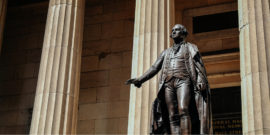Conservative legal minds rank the worst twenty Supreme Court decisions of all time.
Matthew J. Franck
The American judiciary is too politicized, but this cannot be fixed with a revolving jumble of judges.
Marshall's greatness is the product of his belief in the now-unfashionable presupposition that there are right answers to legal questions.
What was the purpose and the effect of the Marshall Court’s decision in McCulloch v. Maryland?
We tend to think of George Washington as the Marble Man, whom all admired and none opposed—Marshall's sober history complicates this view.
Unlike our latter-day advocates of judicial engagement, Marshall saw that the separation of powers embodied principled limits on the judge’s role.
Edward S. Corwin's The "Higher Law" Background of American Constitutional Law offers some insight into the early influences on our law.
Matthew J. Franck is retired from Princeton University, where he was a lecturer in Politics and associate director of the James Madison Program in American Ideals and Institutions. He is also a senior fellow of the Witherspoon Institute, a contributing editor of Public Discourse, and professor emeritus of political science at Radford University.






